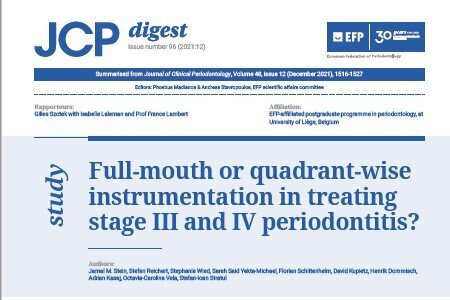![]()
27 February 2022
Full-mouth or quadrant-wise? JCP Digest evaluates approaches to treating stage III and IV periodontitis
Categories:Clinical Practice, Communication

It is more than 25 years since the concept of one-stage, full-mouth disinfection was introduced as an answer to the problem of the rapid recolonisation of recently treated pockets by periodontal pathogens from yet-to-be-treated pockets.
However, subsequent studies comparing one-stage with quadrant-wise subgingival instrumentation have shown varied results.
Research carried out in Germany and Romania, now summarised as JCP Digest 96, evaluated the clinical benefits of quadrant-wise instrumentation versus three different forms of full-mouth instrumentation – full-mouth scaling (FMS), full-mouth disinfection (FMD), and FMD with adjuvant erythritol air-polishing (FMDAP) – in the treatment of stage III and IV periodontitis.
This randomised, blinded, multicentre trial involved 190 patients. It found that FMDAP was the most efficacious of the four treatments and led to the highest reduction in pocket probing depth and pocket closure. All three full-mouth protocols proved more efficacious than quadrant-wise instrumentation based on the time needed to achieve one closed pocket.
The researchers noted that a significant problem with the quadrant-wise approach is the need for multiple appointments, which increases the risk of postponing or cancelling appointments. Full-mouth disinfection thus seems easier to apply in daily practice, they concluded, and the use of air polishers during initial non-surgical treatment should be further studied.
The research was summarised for JCP Digest by postgraduate students at the EFP-accredited programme in periodontology at the University of Liège in Belgium.




